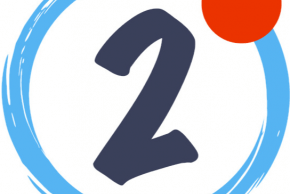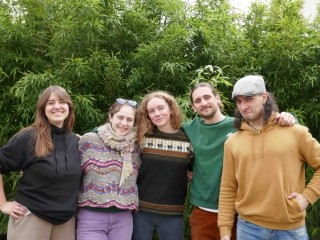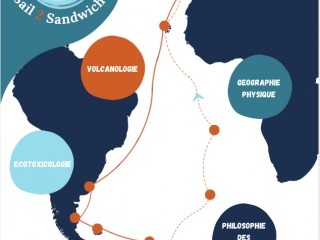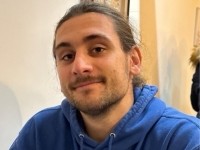Come aboard with Basile, Lucie, Jeanne, Ignazio and Lauriane and set sail for the Southern Sandwich Islands. Volcanology, melting of the ice caps, philosophy of science: their goal? To better understand the effects of climate change and anthropization in the insular and often extreme environments of the southern Atlantic ocean, in collaboration with several French and international research laboratories.
This expedition is also about transmission: the travelling exposition by student-led nonprofit Juste 2.0°C already raised awareness about these crucial issues among over 6000 young students, on top of publishing a documentary, podcasts, leading scientific workshops… and most importantly sharing pedagogical resources for school children and the broader public, available through 2028.
🎯Your support is crucial for this ambitious student-led initiative to come to fruition.
🧭 Sail to Sandwich : a scientific expedition to the edge of the world
Six months of sailing to reach one of the most unwelcoming places on Earth: the Southern Sandwich Islands, a volcanic archipelago lost between the Atlantic ocean and Antarctica. However, Sail to Sandwich is not limited to a sailing trip: it is a scientific and pedagogical project committed to tackling important contemporary issues.
🔬 A transdisciplinary research expedition
Carried out by a team of young researchers, the expedition will study the impact of climate change on extreme insular environments, following 4 axes of study:
-
Environmental geography: studying and mapping the melting of glaciers, and modelling soil salinization. Studying the risks caused by climate change for inhabitants of the islands, such as landslides, water scarcity and shorelines submersion.
-
Ecotoxicology: evaluating the degree of microplastic, antibiotic and heavy metal contamination in marine bird species.
-
Volcanology : measuring volcanic outgassing (CO₂, SO₂…) and its impact on the climate.
-
Philosophy of science : questioning scientific production on ecology in an isolated context.
Collected data will then be analysed during following internships and PhD theses in partnership with 4 partner laboratories. The results will be used for scientific publications, as well as for an awareness campaign.
📚 A national pedagogical action
By collaborating with many different cultural institutions, the project aims to raise awareness of the issues it studies among young students, from primary to high school, with:
- In-class workshops,
- Video conferences streamed directly from the boat,
- An interactive logbook,
- Pedagogical, practical and fun online resources.
Its goal: show the crucial role played by science in our society, raising awareness of transdisciplinary research and issues related to climate change… and sparking callings among students.
🎥 A shared adventure
Throughout the expedition, the team will create:
-
A documentary for school children and the broader public,
-
Several episodes of a podcast,
-
An illustrated account of the expedition,
-
Pedagogical scientific content on social media,
Workshops and presentations for cultural events (festivals, fête de la Science, etc.) -
Varied and fun pedagogical content published on a regular basis on the Juste 2.0°C website.
These easily-accessible formats will allow the wider public to follow this adventure in real time, and promote discourse about ecology, science, and social responsibilities.
🚢 A legendary ship for a unique trip
The team’s associative sailboat, "the Northabout", legendary for being the first ship to ever sail all the way around Antarctica, will leave La Rochelle.
It will sail for the Canary Islands → Cape Verde → Argentina → the Falkland Islands → South Georgia Island → the Southern Sandwich Islands → Tristan da Cunha → Saint Helena.
Why does the ENS Paris-Saclay support this project?
The ENS Paris-Saclay supports transdisciplinary student initiatives which combine scientific excellence, social responsibilities and pedagogical goals.
The Sail to Sandwich project perfectly embodies our core tenets: think differently, bigger and further to transform the world. Led by ENS biology student Basile Carcassin Boisseau, Sail to Sandwich makes use of expertise in biology, geography, geosciences, and philosophy of science—a great mirror of our way of training for research through research.
By supporting this project, the School reaffirms its goal to support talented and socially responsible young minds, to open the doors to science for the wider public, and to take part in a better understanding of global climate issues.
🎥 A movie, a book, a human adventure…
📚 Unique pedagogical resources for teachers and students alike
🧭Scientific exploration to fight for the environment
You too can become an actor of this scientific odyssey.
Join the Sail to Sandwich adventure.
They did it once already: a retrospective on the Antarctique 2.0°C expedition
In 2021, student-led nonprofit Juste 2.0°C set sail for its first great expedition: Antarctique 2.0°C. For six months, a crew of student-researchers sailed to study the effects of climate change in Antarctica. This project brought together:
- 5 scientific fields,
- 11 partner laboratories,
- Over 6000 French students with whom the crew presented their research
- Hundreds of participants at conferences, workshops and events organized in continental France.
This project gave birth to a still-active travelling exposition, and created many pedagogical resources and field-notes accessible to all.
After this first resounding success, the members of Juste 2.0°C leave once more, full of ambition, scientific discipline… and a lot of hope. Come aboard and share their scientific adventure!



